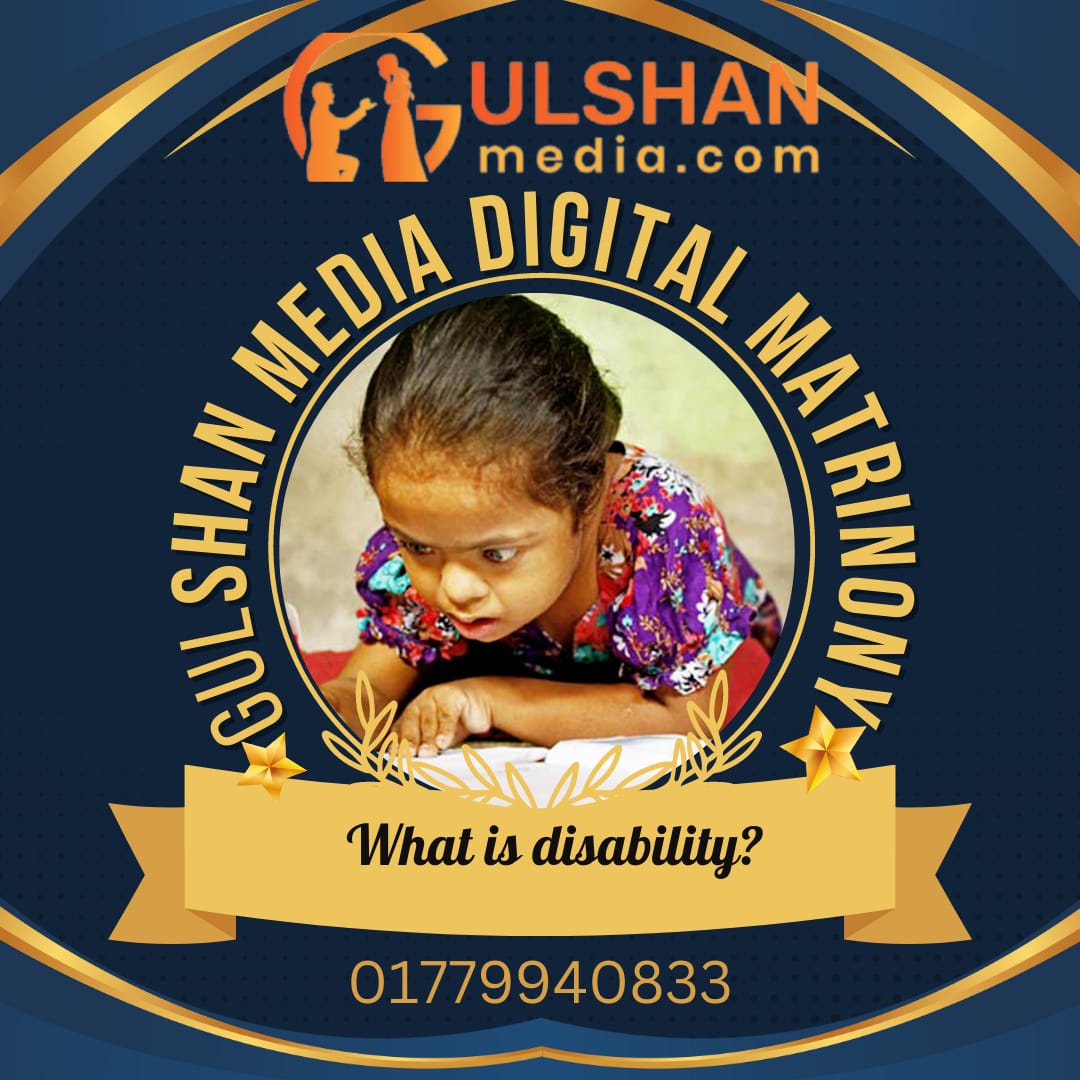What is disability?2023
What is disability?2023

Introduction :
Disability is a diverse and multifaceted concept that encompasses a range of conditions and impairments. In this article, we will explore the meaning of disability, its various forms, and its impact on individuals and society. We will also discuss the importance of promoting inclusivity, accessibility, and equal opportunities for people with disabilities.
Defining Disability : Disability refers to a physical, sensory, cognitive, or intellectual impairment that may limit an individual’s ability to perform daily activities and participate fully in society. It is not solely about an individual’s impairment but is also influenced by societal barriers that hinder their equal participation and access to resources.
Forms and Categories of Disability : Disabilities can manifest in different ways and fall into various categories. Physical disabilities affect mobility, coordination, or physical functioning. Sensory disabilities include visual or hearing impairments. Cognitive and intellectual disabilities impact cognitive processes, learning, and intellectual functioning. Developmental disabilities affect early childhood development and may include conditions such as autism or Down syndrome.
Impact and Challenges : Disabilities can present unique challenges for individuals, such as barriers to education, employment, healthcare, and social inclusion. Physical barriers, inaccessible infrastructure, negative attitudes, and discriminatory practices contribute to the exclusion of people with disabilities. This exclusion can lead to social isolation, limited opportunities, and reduced quality of life.
Promoting Inclusion and Accessibility : Creating an inclusive society involves dismantling barriers and ensuring equal access and opportunities for individuals with disabilities. This includes implementing accessible infrastructure, providing assistive technologies, and promoting universal design principles. It also involves fostering positive attitudes, challenging stereotypes, and promoting the rights and dignity of people with disabilities.
Legislation and Rights : Many countries have enacted legislation to protect the rights of individuals with disabilities. The United Nations Convention on the Rights of Persons with Disabilities (CRPD) serves as an international framework for promoting disability rights and inclusion. It emphasizes the principles of non-discrimination, full participation, accessibility, and equality before the law.
Education and Employment : Access to quality education is essential for people with disabilities to reach their full potential. Inclusive education practices ensure that individuals with disabilities receive appropriate support and accommodations to participate in mainstream educational settings. Similarly, promoting inclusive employment practices, reasonable accommodations, and disability-inclusive workplaces can enhance employment opportunities for individuals with disabilities.
Support Services and Assistive Technologies : Access to support services and assistive technologies can significantly improve the lives of individuals with disabilities. These may include rehabilitation services, therapy, counseling, and assistive devices like mobility aids, hearing aids, or communication tools. Ensuring affordability, availability, and accessibility of these services is crucial for empowering individuals with disabilities.
Challenging Stigma and Stereotypes : Challenging stigma and stereotypes associated with disability is essential for creating an inclusive society. It requires promoting positive representations of people with disabilities in media, arts, and popular culture. By showcasing their achievements, talents, and contributions, we can foster a more inclusive and accepting attitude toward disability.
Advocacy and Empowerment : Advocacy plays a vital role in raising awareness, influencing policies, and promoting the rights of individuals with disabilities. Self-advocacy empowers individuals to express their needs, make informed decisions, and actively participate in shaping their own lives.
Conclusion :
Disability is a multidimensional concept that encompasses a wide range of conditions and challenges. It is crucial to recognize the rights and dignity of people with disabilities and work towards creating inclusive societies that embrace diversity and equality. By promoting accessibility, dismantling barriers, challenging stigma, and fostering equal opportunities, we can build a more inclusive world where everyone can thrive and contribute their unique talents and perspectives.

If there is happiness in the family, how should the family members behave with it?
Introduction :
Happiness is a fundamental aspect of family life, and nurturing it requires conscious effort and a supportive environment. In this article, we will explore how family members can behave to sustain and amplify happiness within the family unit. By adopting positive behaviors, fostering open communication, practicing gratitude, and prioritizing quality time, families can create a harmonious and joyful atmosphere where happiness can flourish.
Open Communication and Active Listening : Open and honest communication forms the foundation of a happy family. Encourage family members to express their thoughts, feelings, and concerns without fear of judgment. Practice active listening, showing genuine interest and empathy when others are speaking. Creating a safe space for open dialogue allows family members to address issues, resolve conflicts, and deepen understanding, fostering happiness and harmony.
Expressing Love and Appreciation : Demonstrating love and appreciation is crucial for sustaining happiness in the family. Regularly express affection, both verbally and through actions. Small gestures like saying “I love you,” giving hugs, or showing appreciation for each other’s efforts can strengthen family bonds and create a positive atmosphere.
Supporting Individual Growth and Dreams : Encourage and support the pursuit of individual goals and dreams within the family unit. Recognize and celebrate each family member’s unique talents, passions, and achievements. By nurturing personal growth and providing a supportive environment, family members can experience fulfillment and happiness, enhancing the overall family dynamic.
Quality Time and Shared Experiences : Allocate dedicated time for shared activities and experiences. Engage in family outings, game nights, or other activities that allow everyone to bond and create lasting memories. Quality time fosters connection, strengthens relationships, and provides opportunities for joy and laughter.
Conflict Resolution and Forgiveness : Conflict is inevitable in any family, but it’s essential to approach conflicts constructively. Encourage open dialogue, active listening, and a willingness to find solutions that satisfy everyone involved. Practice forgiveness and let go of grudges to create a positive and nurturing environment where conflicts can be resolved peacefully, allowing happiness to prevail.
Embracing Flexibility and Adaptability : Families often encounter unexpected challenges and changes. Embracing flexibility and adaptability helps navigate these situations with resilience and positivity. Encourage family members to embrace change, find creative solutions, and support each other during difficult times. Flexibility and adaptability foster a sense of unity and enable the family to weather storms and emerge stronger.
Balancing Responsibilities and Leisure : Creating a balance between responsibilities and leisure time is crucial for family happiness. Encourage family members to share household responsibilities, allowing everyone to contribute and feel a sense of ownership. At the same time, prioritize leisure activities, relaxation, and self-care. Balancing responsibilities and leisure fosters a healthy work-life balance, promoting happiness and well-being for all.
Cultivating a Positive and Supportive Atmosphere : Family members can contribute to a positive and supportive atmosphere by practicing kindness, respect, and empathy. Avoid negative criticism or judgment and instead focus on uplifting and encouraging one another. Create rituals or traditions that promote positivity, such as expressing gratitude during meals or acknowledging each other’s accomplishments regularly.
Taking Care of Physical and Mental Well-being : Nurturing happiness in the family requires prioritizing physical and mental well-being. Encourage healthy habits such as regular exercise, nutritious meals, and sufficient sleep. Pay attention to mental health by fostering open conversations about emotions, providing support during challenging times, and seeking professional help when needed. Taking care of physical and mental well-being contributes to a positive and joyful family environment.
Conclusion :
Nurturing happiness within the family requires intentional behaviors and a commitment to fostering positive relationships. By practicing open communication, expressing love and appreciation, supporting individual growth, spending quality time together, resolving conflicts constructively, embracing flexibility, and prioritizing well-being, family members can create a harmonious and joyful atmosphere that sustains happiness for all.
The understanding of disability has undergone a profound transformation over time, evolving from a purely medical perspective to a more nuanced, rights-based, and socially conscious view. As of 2023, the global consensus, largely influenced by the World Health Organization (WHO) and the United Nations Convention on the Rights of Persons with Disabilities (UNCRPD), emphasizes that disability is not solely an individual’s health condition but rather the result of the interaction between individuals with health conditions and the personal and environmental barriers they face. This contemporary understanding moves away from defining people by their impairments and instead focuses on how society can be made more inclusive and accessible for everyone.
Historical Models of Disability: A Shifting Paradigm
To fully grasp the current understanding, it’s essential to briefly examine the historical models that shaped perceptions of disability:
a) The Medical Model of Disability
For centuries, the predominant view of disability was rooted in the medical model. This model posits that:
- Disability is an individual problem: It sees disability as an inherent defect or impairment within the person’s body or mind that needs to be “fixed,” cured, or managed through medical intervention.
- Focus on impairment: The emphasis is on the individual’s diagnosis, symptoms, and limitations.
- The person is “broken”: This model often leads to a perception of people with disabilities as “sick,” “abnormal,” or “defective,” requiring segregation, institutionalization, or rehabilitation to become as “normal” as possible.
- Solution is medical cure or normalization: Resources are directed towards finding cures, providing assistive devices, or therapies to restore function or minimize the impact of the impairment.
- Professionals hold the power: Decisions about a disabled person’s life are often made by medical professionals, with limited input from the individual themselves.
While medical interventions are undeniably crucial for managing health conditions and improving quality of life, the medical model alone is criticized for pathologizing disability, fostering low expectations, and neglecting the role of societal barriers.
b) The Social Model of Disability
Emerging largely from the disability rights movement in the 1970s and 80s, the social model of disability revolutionized the understanding of disability. It fundamentally shifts the focus from the individual to society. This model asserts that:
- Disability is a social construct: It argues that people are disabled by barriers in society, not by their impairments. The impairment is a physical or mental difference, but the disability arises from the way society is organized.
- Focus on barriers: The emphasis is on identifying and removing physical (e.g., inaccessible buildings, lack of ramps), attitudinal (e.g., prejudice, stereotypes, discrimination), communication (e.g., lack of sign language interpreters, plain language), and systemic barriers (e.g., discriminatory policies, lack of inclusive education).
- Society is “broken”: It challenges society to change and adapt to accommodate the diversity of human functioning, rather than expecting individuals with impairments to conform to a narrowly defined “norm.”
- Solution is social change: The goal is to create an inclusive society where everyone, regardless of their impairment, can participate fully and equally. This involves universal design, reasonable accommodations, and anti-discrimination laws.
- Persons with disabilities are experts: It champions the principle of “nothing about us, without us,” recognizing that people with disabilities are the experts on their own experiences and should lead efforts to remove barriers.
The social model has been instrumental in driving the disability rights movement and influencing policies worldwide, including the UNCRPD. However, it has also faced some criticism for potentially underplaying the real impact of impairments on individuals’ daily lives.
c) The Biopsychosocial Model of Disability
Recognizing the strengths and limitations of both the medical and social models, the biopsychosocial model has emerged as a more comprehensive framework, notably reflected in the WHO’s International Classification of Functioning, Disability and Health (ICF) published in 2001. This integrated model understands disability as a complex interaction between:
- Health Conditions (Bio): Impairments in body functions (e.g., physiological functions of body systems) or body structures (e.g., anatomical parts of the body). These are the medical aspects.
- Personal Factors (Psycho): Individual characteristics such as age, gender, coping styles, social background, education, profession, past experiences, personality, and other factors that influence how a person experiences disability.
- Environmental Factors (Social): The physical, social, and attitudinal environment in which people live and conduct their lives. These include products and technology, natural environment and human-made changes to environment, support and relationships, attitudes, and services, systems, and policies.
In 2023, the WHO continues to emphasize this interactive and dynamic definition: “Disability results from the interaction between individuals with a health condition, such as cerebral palsy, Down syndrome and depression, with personal and environmental factors including negative attitudes, inaccessible transportation and public buildings, and limited social support.”
This definition highlights three dimensions of disability:
- Impairment: A problem in body function or structure (e.g., significant deviation or loss).
- Activity Limitation: Difficulties an individual may have in executing activities (e.g., walking, seeing, hearing, problem-solving).
- Participation Restriction: Problems an individual may experience in involvement in life situations (e.g., working, engaging in social activities, accessing healthcare).
It emphasizes that disability is not just an individual attribute but a mismatch between a person’s characteristics and the features of the environment.

Key Aspects of Disability in 2023
Beyond the theoretical models, the contemporary understanding of disability in 2023 is shaped by several critical elements:
-
Human Rights Framework: The UNCRPD (ratified by 186 States Parties by 2023) is central to this understanding. It champions the rights of persons with disabilities, shifting from a charity or medical approach to a human rights approach. It mandates states to ensure that persons with disabilities enjoy all human rights and fundamental freedoms on an equal basis with others. This means a focus on non-discrimination, accessibility, inclusion, participation, and respect for difference.
-
Diversity of Experience: It is crucial to recognize that “people with disabilities” are not a monolithic group. They are incredibly diverse, encompassing a wide range of impairments (physical, sensory, intellectual, psychosocial, neurological), conditions (congenital, acquired, progressive, static, intermittent), and intersectional identities (gender, age, ethnicity, sexual orientation, socioeconomic status). Two people with the same type of impairment can experience disability in vastly different ways. Many disabilities are also “hidden” or not immediately apparent.
-
Inclusion and Accessibility: The focus is on creating truly inclusive societies where persons with disabilities can participate fully in all aspects of life – education, employment, healthcare, social activities, political processes, and digital spaces. This requires:
- Universal Design: Designing environments, products, and services to be usable by all people, to the greatest extent possible, without the need for adaptation or specialized design.
- Reasonable Accommodation: Necessary and appropriate modification and adjustments that do not impose a disproportionate or undue burden, where needed in a particular case, to ensure persons with disabilities the enjoyment or exercise of all human rights and fundamental freedoms on an equal basis with others.
- Accessible Information and Communication: Ensuring information is available in various accessible formats (e.g., Braille, sign language, plain language, digital accessibility).
-
Anti-Discrimination and Stigma Reduction: Efforts in 2023 continue to combat the deep-rooted stigma, prejudice, and discrimination that persons with disabilities face. This involves challenging negative attitudes, stereotypes, and misconceptions, and promoting positive representation and awareness.
-
Data and Statistics: Accurate data collection on disability prevalence, types, and experiences is critical for informed policymaking and resource allocation. The WHO estimates that approximately 1.3 billion people – about 16% of the global population – currently experience significant disability. This number is projected to grow due to factors like increasing non-communicable diseases and longer lifespans.
-
Intersectional Approach: Understanding that disability intersects with other aspects of identity (e.g., being a woman with a disability, or an Indigenous person with a disability) highlights unique challenges and forms of discrimination that require tailored responses.
-
Technology and Assistive Devices: Advancements in assistive technology (AT) play a crucial role in enabling greater independence and participation. However, accessibility to affordable and appropriate AT remains a global challenge. Digital accessibility has also become a major focus, ensuring online content and platforms are usable by everyone.
-
Rehabilitation: While the medical model is critiqued, rehabilitation remains vital. However, rehabilitation is now seen within a broader context of enabling participation, rather than just “fixing” an impairment. It encompasses not just physical therapy but also vocational, social, and psychological rehabilitation.
Challenges and Future Directions
Despite significant progress, challenges persist in 2023:
- Implementation Gaps: While many countries have ratified the UNCRPD and enacted disability rights laws, implementation often lags, leading to continued barriers.
- Funding and Resources: Adequate funding for accessibility initiatives, support services, and inclusive programs remains a global concern.
- Attitudinal Barriers: Changing deeply ingrained societal attitudes and challenging unconscious biases requires continuous effort and education.
- Emergency Preparedness: Ensuring the safety and inclusion of persons with disabilities in humanitarian crises and emergencies is a critical area for improvement.
- Digital Divide: While technology offers opportunities, ensuring digital inclusion for all, particularly those in low-income settings or with specific impairments, is an ongoing challenge.
In conclusion, the understanding of disability in 2023 is multifaceted, dynamic, and firmly rooted in human rights. It recognizes that disability is a universal human experience and emphasizes that the problem lies not with the individual, but with the societal barriers that prevent full and equal participation. This evolving paradigm calls for systemic changes, inclusive policies, and a collective commitment to creating a world where every person, regardless of their abilities, can thrive and contribute meaningfully.
“বিয়ে সংক্রান্ত যেকোনো তথ্য ,সেবা এবং পরামর্শ পেতে যোগাযোগ করুন গুলশান মিডিয়ার সাথে। ” কল করুন:01779940833
Email: gulshanmedia2@gmail.com








